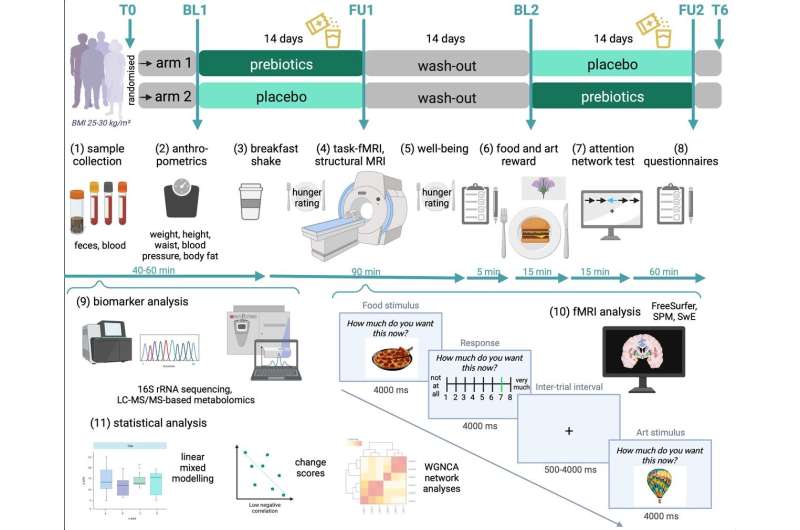This article has been reviewed according to Science X's editorial process and policies. Editors have highlighted the following attributes while ensuring the content's credibility:
fact-checked
peer-reviewed publication
trusted source
proofread
How plant-derived nutrients can affect the gut and brain

Can plant-derived nutrients alter gut bacteria to affect brain function? Scientists from the University of Leipzig Medical Center, the Max Planck Institute for Human Cognitive and Brain Sciences and the Helmholtz Center for Environmental Research investigated this question in a study of overweight adults.
Their findings, published in the journal Gut, suggest that dietary fiber can exert influence on both the composition of gut bacteria and the reward signals in the brain and associated food decision-making.
Prebiotics are used to foster the colonization of beneficial bacteria in the gut. These indigestible dietary fibers are found in plant-derived foods such as onions, leeks, artichokes, wheat, bananas, and in high concentrations in chicory root. They support gut health by promoting the growth and activity of beneficial gut bacteria. Researchers have now investigated whether certain prebiotics can also influence brain function by improving communication between the gut microbiome and the brain.
The interventional study led by the University of Leipzig Medical Center indicates that consumption of high-dose dietary prebiotics leads to a reduction in reward-related brain activation in response to high-calorie food stimuli. "The results suggest a potential link between gut health and brain function, in this case food decision-making," says PD Dr. Veronica Witte, co-author of the study and a scientist at the University of Leipzig Medical Center.
Young to middle-aged adults who were overweight were selected for the study who followed an omnivorous, Western diet. The 59 volunteers consumed 30 grams of inulin, a prebiotic from chicory root, daily for 14 days. During functional MRI imaging, participants were shown pictures of food and asked how much they desired to eat the meals depicted. Following the MRI experiment, they were provided with their highest rated dish and asked to consume it.
The MRI examination was repeated at four timepoints, before and after the prebiotic administration and before and after a placebo phase in which the participants were given a preparation with identical energy density but without prebiotics. When the participants evaluated high-calorie foods, there was comparatively less activation of reward-related brain areas after they had consumed the prebiotic fiber. This effect was accompanied by a shift in the composition of the gut bacteria.
The findings, derived from advanced neuroimaging, next-generation sequencing of gut bacteria, and combined analyses of potential metabolic pathways, suggest that functional microbial changes may underlie the altered brain response towards high-caloric food cues. Fasting blood samples from the participants underwent analysis for gastrointestinal hormones, glucose, lipids, and inflammatory markers. In addition, gut microbiota and their metabolites, namely short-chain fatty acids, were measured in stool samples. The research was conducted within the Collaborative Research Center 1052, Obesity Mechanisms.
"Further studies are needed to investigate whether treatments that alter the microbiome could open up new avenues for less invasive approaches to the prevention and treatment of obesity. A better understanding of the underlying mechanisms between the microbiome, gut, and brain could help to develop new strategies that promote healthier eating habits in people at risk," says Dr. Witte. A follow-up study is currently underway, examining the effects of long-term, high-dose prebiotic administration over six months on eating behavior, brain function and body weight in people living with overweight and obesity.
More information: Evelyn Medawar et al, Prebiotic diet changes neural correlates of food decision-making in overweight adults: a randomised controlled within-subject cross-over trial, Gut (2023). DOI: 10.1136/gutjnl-2023-330365





















